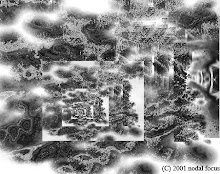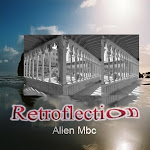Today, I want to talk about exo-centric people and music. When I was very young the news programs (CBS, NBC, or ABC) used small sections of what I thought was the most interesting music in the world at the beginning of the broadcast. How did they do it? Why didn't the radio play stuff like that? One might expect that at least a few songs would have the repetitive patterns and bleeps, bloops and rapid notes and sounds pulsed to the viewer's ears. My family and friends thought I was odd to like the sounds and they had no idea how they were done. Then one day while in the car on the way to school I heard a song called simply "popcorn" and my interest in electronic sounds and music became love. How did they do that? Back then many AM stations played everything from Conway Twitty to the Beatles with everything in between.
Synthesizer?
After I first began to understand that a synthesizer was capable of making the most unusual sounds and realizing that all those knobs and cords had a purpose and could become organized to create 'patches', it dawned on me. "They are not cheap!" I wanted one the second i found out they were the tool making the magic. Some producers considered synthesizers to be money machines although many groups never listed them on the credits or elsewhere. (LPs had a ton of room for liner notes)
Today we would jump for joy to see massive analog devices with patch cables for less than a few K. In 1975 that was a LOT of money. Actually, of the largest Moog Modulars on a few were built. One look at a vintage video with Emerson Lake and Palmer and you may see how large and complex they were.
In 1984 when I began to set up for midi I once again had to wrap my mind around something that all artists must deal with. "What am I trying to say with sound and how am I going to do this?" Looking into my college loan funds I calculated that after buying a fostex 4 track, akai s-700 sampler, sequencer, Atari 1040 st with maxed RAM I would be able to afford food for, say, maybe a week. A JX 3p with programmer cost about $ US.1600.00 Then came the new DX that was about 2k and needed a computer to program it unless you were very patient and had an elephant's memory! Actually as a cost saving measure almost every synth module or keyboard needed an editor. You could buy the software but actually using it took either a midi mentor or some classes in electronic music. Knobs cost too much for mass production. Presets were used even by pro musicians.
I started at Lane Community College with basic audio and production classes and learned to make cut and splice tape loops on an Otari deck.That was the year that Ed McManus (former keyboard magazine editor and studio operator in Eugene , Oregon) started the Electronic arts program. When i walked into the Lab for the first time, I nearly ran to the ARP 2600 but since the room was like 18 x 12 it was more like 3 fast steps...Then I saw an Oberheim 4 voice and Obie drum machine, DX 7 and a few other items including a Mac that looked like a little 10 inch screen grafted to a Russian tank or something. MIDI! And ANALOG.
There was Alesis FX and a sequencer still in use today by many artists. The lab had a small mixing board with like 12 inputs but it was quality. Did I mention the Emu Emax? Yeah, I still have access to that too.
Then, the studio was small and only a few students were involved. Getting studio time was a matter of patience and waiting for people to be a no show, sign in took luck and patience, only to realize the studio was NOT in the default posistion. Aiiiiii!!!
Notes were important, as the signal chain would mysteriously and completely fail. Or someone might be working on an edit or something detailed and allow me to use the ARP or another machine. The analogs was almost always free. Coaxing weird sounds out of the ARP required practice and a single turn of a knob and a moved patch cord made an entirely NEW sound/noise. Getting the original back was nearly impossible even with notes. So I recorded hours of stuff.
I knew a few people who could wax poetic about hexadecimal midi data, the signal chain down to the smallest resistor and why Digital was superior to analog. Trade offs at every point...I recall people selling their analog stuff for the latest digital synth that cost 2k (Roland D 50?) thinking, man, Linear Arithmetic synthesis is the ultimate! I still have my D 550 module and it is pretty amazing still. Additive, subtractive, Frequency Modulation and even Phase Distortion machines were on the pages of every Keyboard magazine. Gear lust..
I later found a rare Korg analog sequencer for 90$ US in Omaha, Nebraska and got a Korg PS 3100 for 350$ after the local music store in Eugene had ordered 2, one for Mike Garrison back around 1980. It sat in the store for years with a 3,500$ price tag on it before I lucked out.
The store was an exhibitor at a weekend long music fair at L.C.C.and the guy's helper walked right before it was time to break down the display. I offered to roadie the gear onto the van and the store owner invited me by sometime for a deal. I went to the store several weeks later and he led me to the Korg PS 3200. "Could you pay 10% of the price?" he asked me. I was so amazed i could not do the math and he gently told me, "That would be 350$..." I asked if I could go get the money and he said, "That machine is YOURS David." I went to a Lady i knew from Church and asked for a loan. She drove me to the store and shelled over the cash and as I loaded it into the car realized it weighed nearly 80 pounds. It included the original yellow Korg sticker which I still have, unused. I helped her out at her home for a while doing yard work until it was paid up.
Ed McManus had an incredible philosophy and taught us all that the music industry was a business and a hard one to get into successfully. He was a terrific help for those of us lucky enough to get in on the ground floor of the MIDI revolution! L.C.C. has an amazing class room-studio set up now and is probably among the best I ever saw.
Oh, I got so caught up in the synth stories I forgot the Exo part. Ah well, maybe next time!
David Grindstaff
Wednesday, April 27, 2011
Subscribe to:
Comments (Atom)
-2001-Nodal.jpg)
